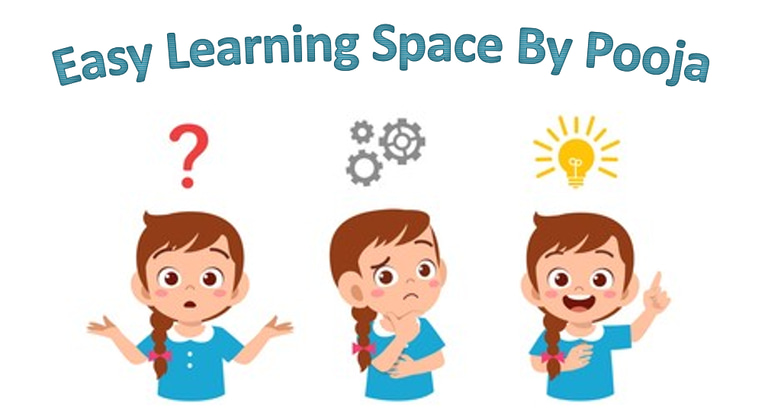12 Tenses in English with Examples — A Complete Guide for Parents, Teachers & Students
Do advanced English tenses confuse you or your students? Understanding tenses like Present Perfect, Past Perfect, and Future Perfect can feel tricky — but they’re the secret to speaking and writing fluently. In this guide, we break down advanced tenses with easy explanations and real-life examples. Perfect for parents, teachers, and young learners who want to take their English to the next level!
English tenses are the backbone of grammar. They help us talk about actions happening in the past, present, or future. But for many learners — and even adults — tenses can feel confusing.
In thi , you’ll learn all 12 tenses in English with simple explanations and easy examples you can use in the classroom or at home.
Why Learn Tenses?
Mastering tenses improves speaking, writing, and understanding. It helps children express themselves clearly and adults avoid common mistakes.
The 12 English Tenses Explained
English tenses are divided into three main time frames:
Present
Past
Future
Each time frame has four aspects:
Simple
Continuous (Progressive)
Perfect
Perfect Continuous
Let’s break them down with definitions and examples.
1. Simple Present Tense
Use: For daily habits, general truths, and facts.
Formula: Subject + base verb (+ s/es for he/she/it)
Example:
She reads every night.
The sun rises in the east.
She loves to play cricket.
He writes an e-mail to his best friend every day
2. Present Continuous Tense
Use: For actions happening now or temporary actions.
Formula: Subject + am/is/are + verb + ing
Example:
I am writing a blog.
They are playing outside.
My dad is working on a project.
The students are preparing for the game.
Our company is launching a new product.
She is learning to play guitar.
3.Present Perfect Tense
Use: For actions that started in the past and continue, or just completed actions.
Formula: Subject + has/have + past participle
Example:
He has finished his homework.
We have lived here for five years.
You have joined the debate club
He has prepared the dinner
We have driven to the beach
4.Present Perfect Continuous Tense
Use: For actions that started in the past and are still happening (focuses on duration).
Formula: Subject + has/have been + verb + ing
Example:
She has been studying for two hours.
I have been working here since 2010.
He has been reading this book in the last three hours
5.Simple Past Tense
Use: For completed actions in the past.
Formula: Subject + past form of verb
Example:
They visited the zoo yesterday.
He watched a movie last night.
I played cricket yesterday.
We ate food.
He painted his room blue.
She went to the movie yesterday.
6.Past Continuous Tense
Use: For an action that was happening at a specific time in the past.
Formula: Subject + was/were + verb + ing
Example:
I was reading when you called.
They were playing football at 5 PM.
I was working on my assignment.
She was not watching the movie.
They were going to the library.
7.Past Perfect Tense
Use: For an action completed before another action in the past.
Formula: Subject + had + past participle
Example:
She had left before I arrived.
We had finished dinner when the guests came.
I had worked with Cooper for 10 years.
Priya bought a camera for her 18th birthday.
I had learnt Italian in my last year of college.
8.Past Perfect Continuous Tense
Use: To show how long something had been happening before another past event.
Formula: Subject + had been + verb + ing
Example:
They had been waiting for an hour when the bus arrived.
He had been studying all day before the exam.
She had been drinking the milk out of the carton when dad walked into the kitchen.
9.Simple Future Tense
Use: For actions that will happen later.
Formula: Subject + will/shall + base verb
Example:
I will call you tomorrow.
She will visit her grandparents.
I will go to the store tomorrow
She will call you later
He will be here in an hour or two.
10.Future Continuous Tense
Use: For an action that will be in progress at a future time.
Formula: Subject + will be + verb + ing
Example:
This time tomorrow, I will be traveling.
They will be watching the match tonight.
The baby will be playing here for the whole day
Priya will be running the marathon tomorrow.
I will chair the meeting tomorrow.
11.Future Perfect Tense
Use: For an action that will be completed before a specific future time.
Formula: Subject + will have + past participle
Example:By next week, she will have finished the project.
They will have left by 10 PM.
By the time you read this, I will have left .
Will you have eaten when I pick you at 5pm?
12.Future Perfect Continuous Tense
Use: To show how long an action will have been happening up to a point in the future.
Formula: Subject + will have been + verb + ing
Example:By next year, I will have been working here for ten years.
She will have been studying for three hours by noon.
Tips to Teach Tenses to Kids
1️⃣ Use simple examples from daily life.
2️⃣ Make a tense chart and stick it near their study desk.
3️⃣ Practice with worksheets and short quizzes.
4️⃣ Encourage them to speak in English using different tenses.
5️⃣ Play games — for example, say a sentence and ask them to change its tense.
You can also refer the basics of the tenses in the below article
Understanding Verbs, regular and irregular verbs | Easy Learning Space by Pooja
With Love
Pooja

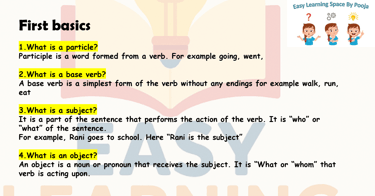
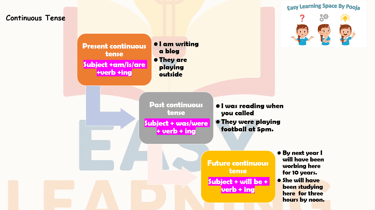
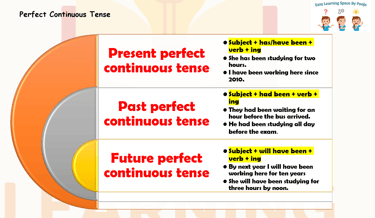
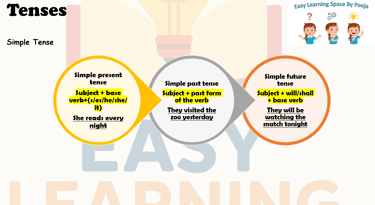
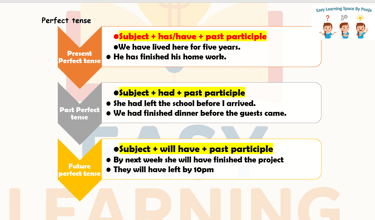





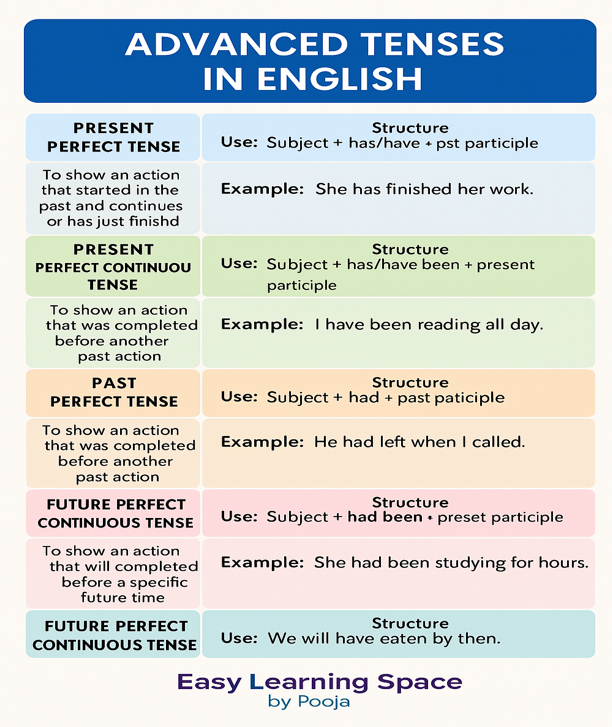

Address
Pooja
Bangalore
Contacts
easylearningspacebypooja@gmail.com
Subscribe to our newsletter
This blog is for educational purpose only
All the information on this website – www.easylearningspace.com – is published in good faith and for general educational and informational purposes only. I aim to provide helpful teaching tips and resources, but I make no warranties about the completeness, reliability, and accuracy of this information.
Any action you take upon the information you find on this website is strictly at your own risk. I will not be liable for any losses
